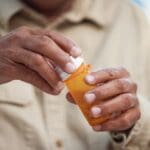If you’re in recovery from a substance use disorder, the holidays can be a precarious time for your sobriety. In some ways, it might be an added boost to spend more time with the people you love and break up your routine. But those things can quickly lead to stress, too, even in the best of situations. You learned in addiction treatment the importance of dealing with stress in healthy ways, so now it’s time to apply that knowledge to the fall and winter holiday seasons.
We offer some tips below but know that if you’re struggling and have relapsed (or are afraid you will), Raleigh Oaks is always here to help. Our compassionate team in Garner, NC, understands the pressures you may be facing, and we can provide the care you need to get back on track.
A Few Holiday Relapse Prevention Tips
- Ask for help. This is a big one. If you’re in recovery, you know that no one can thrive on their own. We all need support, and most people are happy to help if they are able. And there’s so much you might need help with over the holidays: buying and wrapping gifts; planning meals, shopping for groceries, and cooking; decorating inside and out; cleaning; childcare; and more. Don’t let yourself get overwhelmed. Reach out to those around you and ask for the gift of their time.
- Prioritize. Maybe we should have put this one first, before asking for help. Because when you take some time to prioritize, you have a much better sense of what you can handle, the time you have to handle it, and at which points you may need some assistance. Before the holidays arrive, do some planning. If you live with your family, set up a time to discuss your holiday priorities.
What do you value most? What overwhelms you? What tasks do you enjoy, and what tasks do you dread? Where can you cut back, minimize, go lightly?
Remember that just because you’ve done something in the past does not mean you have to do it this year. If your family wants cookies and you don’t enjoy baking, assign the baking (and cleaning up!) task to someone else. If no one wants to bake, buy your cookies this year. If your family and friends expect lavish gifts but your budget is tight this year, consider other options: homemade gifts, a coupon for help with yard work, exchanging names so each person buys one gift instead of ten, etc.
- Communicate. Your family probably already knows that you’re in recovery, but they may still need to be told what exactly that means for you when it comes to events like holiday gatherings. If going to a holiday party is triggering for you, communicate this with the host and explain why you won’t be able to come this year or may have to leave early. Explain what relapse triggers are and how you try to avoid them. Explain how stress affects you and what you need to do to minimize stress this year.
- Set boundaries. If your family or friends have difficulty understanding your needs or tend to steamroll you into doing what they think you should do, set some boundaries. Consider prioritizing boundaries that relate to self-care. For example, maybe you need to be firm about what time you need to go to bed. Maybe you need to be firm about guests not bringing alcohol or drugs to your home. Maybe you need to insist on continuing your recovery meeting schedule, even if it interferes with an event you’ve been invited to attend. Which brings us to our next point…
- Stick with your recovery routine. You learned in treatment how important it is to surround yourself with sober support, people who are also committed to recovery and who understand your journey. You also learned the importance of maintaining your recovery routine, which might include regular therapy appointments, outpatient care, attending support group meetings, communicating with a sponsor, and taking care of your health.
The holidays can seem like a time when it’s okay to break these routines. We encourage you instead to amp your routine, especially if you’re struggling. Add another support group meeting to your schedule, or ask your therapist for an extra appointment. Keep a sober friend on call for times when you’re desperate for some perspective–or just for some sober company.
The holidays can be a wonderful, rich time to enjoy giving and receiving gifts, spending time with family, and connecting to whatever you find spiritually meaningful about the season. But if you’re in recovery and need some help staying on track, just ask–a friend, a family member, or one of our counselors here at Raleigh Oaks.






